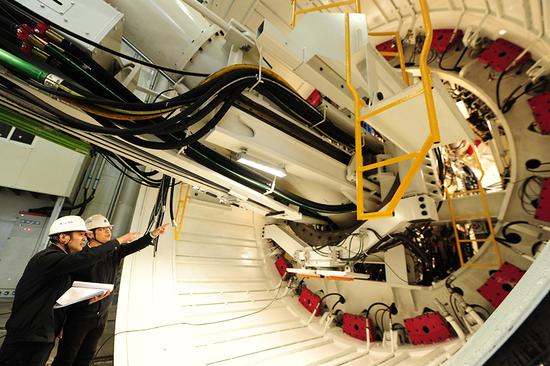
Technicians check shield tunneling machines at a manufacturing plant in Nanjing, capital of Jiangsu Province. (Photo/for China Daily by Hai Xin) The United States' aggressive trade tariff measures on Chinese products will push China's mechanical and electrical manufacturers to further boost innovation that covers the entire industrial chain, especially in areas such as new materials, processing and electronic techniques, industry officials said on Tuesday. The escalating bilateral trade dispute has made the Chinese government and companies to realize what core parts and technologies China urgently needs to ensure its industrial security and export channels, and some products can only be gained via self-innovation and prolonged research process, said Chen Bin, executive vice-president of the China Machinery Industry Federation. Trade in mechanical and electrical products between China and the U.S. amounted to $100 billion in 2017, while China shipped $70 billion worth of manufacturing goods including vehicle and industrial parts, cable wires, machine tools, pumps and valve equipments to the U.S. market, data from the Beijing-based CMIF show. As China has mature manufacturing foundations, the country doesn't need to rely on machinery and parts import from the U.S.. Germany, Sweden, France, Japan and South Korea can meet the country's demand for various industrial parts and equipment, he said. Besides, the U.S. doesn't allow high-tech products such as inertial navigation systems, advanced composite materials and high-end communications equipment to be exported to China. However, as the U.S. manufacturing sector not only accounted for the most advanced and profitable industries, Chen said Chinese manufacturers must be aware that innovation in the U.S. is often accomplished not by the sole effort of a company, specific industries in the country are often concentrated in a particular area that allows for collaboration and a sharing of resources. Because of the gap in manufacturing and internet-connected technologies, the federation stressed that China is still unable to ship passenger vehicles, petrochemical equipment, and electrical and electronic machines in large amounts to the U.S. market. "If we realize these elements earlier and invest more in these sectors, many of our manufacturing industries will perform better in global industrial chain and will not be easily blackmailed by the U.S.," said Dong Yang, executive-vice president of the China Association of Automobile Manufacturers. Even though Chinese companies have already made technological breakthroughs in producing high-quality bearings for high-speed trains, hydrogen cells, intelligent concrete ejectors and container transshipment vehicles over the past two years, Dong urged domestic players to try controlling more of the manufacturing value chain, like their rivals in the U.S. and Germany. As China upgrades its economy and domestic consumption structure, the nation's demand for industrial robots, refrigeration facilities, construction machinery, hydraulic components, environment protection and pollution control products has surged fast over the past two years. Total exports by China's machinery sector stood at $686.7 billion in the first half of 2018, up 14.9 percent from the same period a year earlier, while imports during this period jumped 19.7 percent to $455.7 billion, according to CMIF. |
Powered by Discuz! X3.4
© 2001-2013 Comsenz Inc.